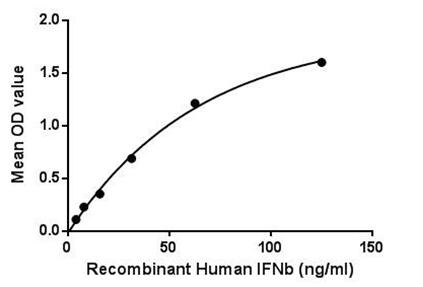Active Interferon Beta (IFNb)
IFNB1; IFN-B; IFB; IFF; IFNB; Interferon Beta 1 Fibroblast
- Product No.APA222Mu01
- Organism SpeciesMus musculus (Mouse) Same name, Different species.
- Buffer FormulationPBS, pH7.4, containing 0.01% SKL, 5% Trehalose.
- TraitsFreeze-dried powder
- Purity> 95%
- Isoelectric Point9.7
- ApplicationsCell culture; Activity Assays.
- Download Instruction Manual
- UOM 10µg50µg 200µg 1mg 5mg
-
FOB
US$ 236
For more details, please contact local distributors!US$ 590
For more details, please contact local distributors! US$ 1180
For more details, please contact local distributors! US$ 3540
For more details, please contact local distributors! US$ 8850
For more details, please contact local distributors!
ACTIVITY TEST of the Active Interferon Beta (IFNb)

Interferon Beta (IFNb) is belongs to type I interferons (IFNs) family which a large subgroup of interferon proteins that help regulate the activity of the immune system. The IFNb proteins are produced in large quantities by fibroblasts. They have antiviral activity that is involved mainly in innate immune response. Two types of IFNb have been described, IFNb1 (IFNB1) and IFNb3 (IFNB3). IFNb1 is used as a treatment for multiple sclerosis as it reduces the relapse rate. Besides, Interferon Alpha/Beta Receptor 1 (IFNa/bR1) has been identified as an interactor of IFNb, thus a binding ELISA assay was conducted to detect the interaction of recombinant human IFNb and recombinant human IFNa/bR1. Briefly, IFNb were
diluted serially in PBS, with 0.01% BSA (pH 7.4). Duplicate samples of 100uL were then transferred to EP300-coated microtiter wells and incubated for 2h at 37℃. Wells were washed with PBST and incubated for 1h with anti-IFNb pAb, then aspirated and washed 3 times. After incubation with HRP labelled secondary antibody, wells were aspirated and washed 3 times. With the addition of substrate solution, wells were incubated 15-25 minutes at 37℃. Finally, add 50µL stop solution to the wells and read at 450nm immediately. The binding activity of IFNb and IFNa/bR1 was shown in Figure 1, and this effect was in a dose dependent manner.
USAGE of the Active Interferon Beta (IFNb)
Reconstitute in 10mM PBS (pH7.4) to a concentration of 0.1-1.0 mg/mL. Do not vortex.
STORAGE of the Active Interferon Beta (IFNb)
Avoid repeated freeze/thaw cycles. Store at 2-8°C for one month. Aliquot and store at -80°C for 12 months.
STABILITY of the Active Interferon Beta (IFNb)
The thermal stability is described by the loss rate. The loss rate was determined by accelerated thermal degradation test, that is, incubate the protein at 37°C for 48h, and no obvious degradation and precipitation were observed. The loss rate is less than 5% within the expiration date under appropriate storage condition.
INCREMENT SERVICES
BCA Protein Quantification Kit
Molecular Mass Marker for Protein
Monoclonal Antibody Customized Service
Polyclonal Antibody Customized Service
Protein Activity Test Experiment Service
Electrophoretic Mobility Shift Assay (EMSA) Experiment Service
Buffer
Lentivirus Packaging Experiment Service
Adenovirus Packaging Experiment Service
Real Time PCR Experimental Service
Spike RBD Protein (S-RBD)
Protein G
Protein A
Related products
| Catalog No. | Organism species: Mus musculus (Mouse) | Applications (RESEARCH USE ONLY!) |
| EPA222Mu61 | Eukaryotic Interferon Beta (IFNb) | Positive Control; Immunogen; SDS-PAGE; WB. |
| APA222Mu61 | Active Interferon Beta (IFNb) | Cell culture; Activity Assays. |
| RPA222Mu02 | Recombinant Interferon Beta (IFNb) | Positive Control; Immunogen; SDS-PAGE; WB. |
| APA222Mu01 | Active Interferon Beta (IFNb) | Cell culture; Activity Assays. |
| RPA222Mu01 | Recombinant Interferon Beta (IFNb) | Positive Control; Immunogen; SDS-PAGE; WB. |
| PAA222Mu02 | Polyclonal Antibody to Interferon Beta (IFNb) | WB; IHC; ICC; IP. |
| PAA222Mu01 | Polyclonal Antibody to Interferon Beta (IFNb) | WB; IHC; ICC; IP. |
| SEA222Mu | ELISA Kit for Interferon Beta (IFNb) | Enzyme-linked immunosorbent assay for Antigen Detection. |
| MEA222Mu | Mini Samples ELISA Kit for Interferon Beta (IFNb) | Enzyme-linked immunosorbent assay for Antigen Detection. |
| LMA222Mu | Multiplex Assay Kit for Interferon Beta (IFNb) ,etc. by FLIA (Flow Luminescence Immunoassay) | FLIA Kit for Antigen Detection. |

